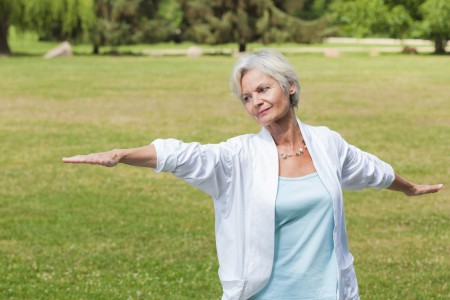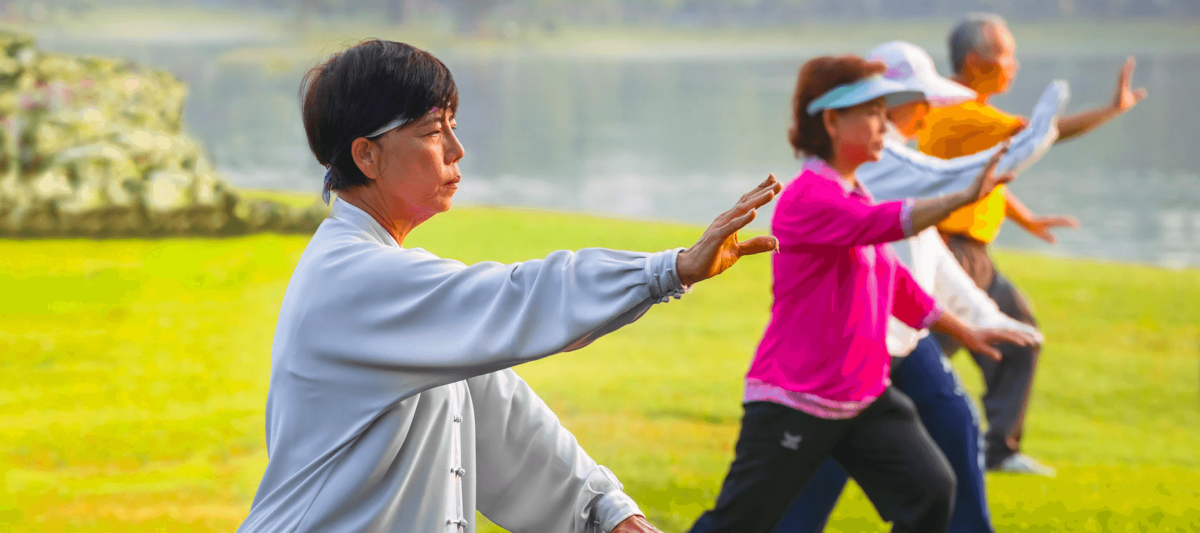What is Tai Chi?
The Chinese martial art tai chi means “Supreme Ultimate Boxing” and has been practiced in China for many years for its health benefits as well as a form of defense training. ¹
These days the practice has spread around the world and is a popular health activity, especially amongst seniors.
Tai chi is not just an exercise, it is a full mind and body practice. It involves gentle movements through specific postures, all the while focusing on relaxation and breathing. If these movements are practiced quickly they can be a form of self-defense or combat – but they are often performed slowly as a form of moving meditation. ²
Tai chi has a number of benefits including improving neuromuscular co-ordination, reducing the risk of falls by improving balance and promoting bone health by increasing the strength of your bones.
Tai chi is particularly suitable for elderly people because it is low to moderate intensity and it has been practiced by elderly people in China for many centuries. ³
One of the great things about this exercise is that it can be adapted to fit any fitness level. The movements are low impact, gentle and flowing and easy on the joints. They can even be performed seated or in a wheelchair if necessary.
How Does Tai Chi Benefit Your Bones?
 According to a study that was reported in Physician and Sportsmedicine, it was found that a regular habit of tai chi could effectively slow bone loss in women over menopausal age. ⁴
According to a study that was reported in Physician and Sportsmedicine, it was found that a regular habit of tai chi could effectively slow bone loss in women over menopausal age. ⁴
The average age of the 132 women who participated in the study was 54 and all of the women who were in the study were within 10 years of the start of menopause.
The study showed that women who practiced tai chi for 45 minutes per day, five days per week for a year had a rate of bone loss that was 3.5 times slower than those who didn’t.
This improvement was reflected in their bone mineral density.
Improve Your Balance with Tai Chi
One of the main benefits of tai chi is improved body awareness and balance. This practice has been shown to reduce the risk of falling in elderly people, which subsequently reduces the risk of fractures.
According to a study in the 1996 American Geriatric Society journal, elderly adults that participated in a 15 week tai chi program were able to successfully reduce their risk of falling by 47.5%. ⁵
Keeping up a habit of regular tai chi will ensure that you have better balance and bodily awareness, which is essential in reducing the likelihood of a dangerous fall.
Weight Bearing Exercises Will Strengthen Your Bones
Your bones are living tissue and they react by growing stronger when you increase the load they need to bear. ⁶ Weight bearing exercises are very helpful for strengthening your bones.
Tai chi is a weight bearing exercise as it involves supporting your own body weight through your feet, legs, hands or arms as you work your way through the movements.
How Can You Apply This to Your Life?
So how can you get started with tai chi and begin to enjoy the benefits of this exercise in your life?
1. Find a Qualified Teacher
The first step is to find a good teacher who will be able to explain the movements to you and tell you how to start. Take a look to see if tai chi courses are offered by your local community centre, gym, college or fitness centre.
You might want to check out a few classes until you find the one that matches your fitness level.
Just like yoga – trying a few drop-in classes is a great way of finding a teacher who works for you. It is important to find a teacher who will show the moves to you so that you understand and can follow along correctly without injuring yourself.
2. Practice Regularly
You’ll see the best results from tai chi if you practice it daily. It’s better to do it for 20 minutes per day rather than several hours at once on the weekend. Make a commitment to doing a little bit of tai chi every day and after a few weeks this will become a habit for you.
3. Dress Appropriately
Make sure that you wear the right clothing for your tai chi class. Loose fitting lightweight cotton is the best, because it will allow you to move freely, allow your skin to breath and absorb sweat.
Tight clothing such as yoga pants and leotards are not worn for tai chi, as it is believed that clothing such as this may restrict the flow of Qi through the body.
As for your shoes, you can either practice in bare feet or wear comfortable lightweight shoes with a thin sole. Many martial art shops sell shoes that are designed for tai chi and these will be comfortable and will have a broad base support to help you maintain balance.
4. Go At Your Own Pace
Remember to go easy on yourself in the beginning. You are learning a new skill and you might find some of the moves and postures to be confusing or challenging at first. Stay calm and stick with it, you will improve over time with the guidance of a qualified teacher.
If you are unsure about something or don’t understand a particular move, feel free to ask your instructor for help.
Take your time and enjoy the process of learning tai chi – it is a relaxing art that will not only help to increase the strength of your bones but will also grant you a feeling of serene calm that you can carry with you throughout your day.
Have you tried tai chi before? Let us know what your experience was like in the comments below!
Sources:
- https://nccih.nih.gov/health/taichi/introduction.htm
- Proceedings, M. C. (2016, September 1). tai chi and Qi Gong: In depth. Retrieved October 8, 2016, from https://nccih.nih.gov/health/taichi/introduction.htm
- Lui, P., Qin, L., & Chan, K. (2008). tai chi Chuan exercises in enhancing bone mineral density in active seniors. Clinics in sports medicine., 27(1), 75–86. Retrieved from https://www.ncbi.nlm.nih.gov/pubmed/18206569
- Peter M. Wayne, Douglas P. Kiel, and David E. Krebs, et al.. The Effects of tai chi on Bone Mineral Density in Postmenopausal Women: A Systematic Review.. Archives of Physical Medicine and Rehabilitation. 2007
- Institute, N., & Aging. (2011, June 30). Tai chi for older people reduces falls, may help maintain strength. Retrieved October 8, 2016, from https://web.archive.org/web/20161006142811/https://www.nia.nih.gov/newsroom/1996/05/tai-chi-older-people-reduces-falls-may-help-maintain-strength
- 2016, N. O. S. (2016). Exercise and strong bones the national osteoporosis society. Retrieved October 8, 2016, from https://nos.org.uk/about-osteoporosis/your-bone-strength/bone-building-exercise/





Sylvia Norton
October 15, 2016 , 9:25 amMy husband and I (both 72 yrs old) started Tai Chi 2 years ago. It is excellent for maintaining balance and has helped me to recover from bilateral hip replacement surgery. We have found it helpful before our 3x/week class to watch a video of Master Moy performing the 108 moves. (https://www.youtube.com/watch?v=f9BFWJsrmSY) (http://www.taoist.org/)